Colin “Braveheart” Hendry, who led Scotland into their last World Cup against Brazil in 1998, has never forgotten his footballing roots in Keith.
The 59-year-old, whose jobs as a youngster included delivering The Green Final on Saturday evenings and milk before school during the week, says Keith FC’s multiple trophy-winning boss Bobby Wilson put him on the right track to football success.
As a teenager, Hendry snubbed the advances of Motherwell, who were then managed by future Rangers boss Jock Wallace.
He instead ended up moving from his hometown in Moray to Dundee in 1983, signed by Don Mackay.
Hendry – who never lost a cup final during his career – played more than 600 games as a professional, and won the English Premier League with Blackburn Rovers in 1995.
He says the “pinnacle”, though, was (of course) captaining Scotland in the 1998 World Cup in France, leading his team out for the opening game against Brazil (a 2-1 defeat before drawing 1-1 with Norway and losing 3-0 to Morocco). He won 51 caps and scored three goals.
Being part of a Rangers side who won the treble in 1999 was also among Hendry’s career highlights.
When he was growing up, Hendry couldn’t get enough of football – but showed talent more as a forward than the defender the nation loved to watch compete with the best players on the planet.
Three games within 36 hours during Keith baptism
Hendry recalled his action-packed weekends in Keith as a budding young footballer.
He said: “I would sometimes be playing three games over 36 hours.
“You’d play for your school team on the Saturday morning, Islavale on Saturday afternoon – where I’d sometimes be flagging – then 24 hours later, I’d be playing another game (for Keith juniors)… but I couldn’t get enough of it!
“To play three games within two days – that was sports science back in the day.”
Hendry’s father Eddie helped to set up local leagues for boys, which allowed youngsters aged eight or older to play under-12s football.
It led to some heavy defeats and harsh learnings against older opponents, but as the years passed, Hendry and his peers were physically ready when reaching the under-16 division.
He said: “My dad, Eddie, became a big part of the boys’ leagues.
“He wasn’t a footballer, but he loved his football – and was an Aberdeen fan.
“When I was at school, Rangers were the team I always thought about, but I could never get to any games because I was always playing myself.”
Playing in Keith was ‘real upbringing’
Having that sink-or-swim grounding is something Hendry will forever be grateful for.
His career in the Highland League with Keith was all-too-brief before Dundee snapped him up, but he feels what he learned locally opened doors to experience he could never have dreamt of.
He said: “I played twice for Keith (first-team), but it was a real upbringing for me.
“Present-day players, and kids, get everything done for them. They have got every facility at their disposal.
“But listen, being at Keith worked for me.
“Working under coaches and managers such as Archie Knox and Jocky Scott in my career shows there’s a silver lining when you come through.
“Aged 15 or 16, I scored on my Keith debut against Inverness Thistle.”
Bobby Wilson spotted Hendry’s talents
It was those years before reaching the first-team at Keith where Bobby Wilson, father of legendary Caley Thistle winger Barry, picked Hendry out as a player with real potential.
He said: “Bobby Wilson was the man who discovered me.
“I’ve also had managers like Don Mackay and Craig Brown, who have had major influences in my career.
“I didn’t even have a career when I met Bobby Wilson. Bobby lived in Elgin, but travelled to Keith to take training every Tuesday and Thursday night.
“He came to my house one night and said he’d heard good things about me and two or three of my pals.
“The players at that time who would have been training with Bobby would have been (legendary Keith stars) Neily Rodger, Paul Wisely, Mikey Winton.
“I was 14 or 15, yet I’m training with them, the men – these days that would never be allowed due to all the rules and laws that need to be adhered to.
“But listen, it was great for me. If I’m getting a bit of a thumping in a challenge by an adult, then that’s what it was about. No one complained.
“We just got on with it, or when I was at Dundee and there were a lot of good players who had maybe come up from Glasgow or Edinburgh, you either sank or swam.
“I did, at that point, see a lot of good players falling by the wayside because they couldn’t take the physical rigours of the game.”
Keith FC vice chairman and historian Charlie Simpson confirmed Hendry “played twice in our first-team – in the starting line-up against Inverness Thistle on April 13, 1983 and scored an absolute belter from 20 yards, at the tender age of 17 years 127 days. He also came on as a sub in a 0-0 draw up at Brora at the end of that 1982-83 season.”
Hendry turned down ‘Well offer
Before moving from his Moray home, Hendry had a decision to make when Jock Wallace and (future Celtic assistant boss) Frank Connor tried all they could to take him to Motherwell, even driving to his parents’ house, but Hendry turned it down.
He added: “Bobby asked me to call Motherwell, who invited me for a trial (which was successful). They wanted to sign me, but I declined it.
“Next thing I knew, I was on trial at Dundee. I scored two goals against Dumbarton or Dunfermline at Dens Park, and (manager) Don Mackay said: ‘We’re not letting you go without signing you’ – that was the start of my whole career.”
Hendry played for Dundee alongside Jim Duffy in the “Albert Kidd game” in 1986 when Kidd’s two goals sunk Hearts 2-0 and Celtic’s 5-0 rout of St Mirren at Love Street took the title to Glasgow rather than Edinburgh.
He said in was another memorable mark in his career that ex-Celtic star Frank McAvennie recently said he couldn’t believe he was part of.
‘Pinnacle’ was leading Scotland into the World Cup in 1998 v Brazil
But what moment trumps them all for Hendry in a career packed with drama and success?
Hendry said: “In England, there is nothing bigger than winning the Premiership.
“Right now, it has become the best league in the world – it’s also the biggest financed-league in the world. It’s the biggest and the best and I’ve won that.
“That said, when you win the treble with Rangers, in the way we won it at Celtic Park, that is some achievement. That would probably never happen again due to the fixture computer.
“Above all, though, captaining my country at the World Cup is the pinnacle of my career.
“My late wife Denise was there and my dad – who has since passed away – was there, too.
“We’re 26 years on from the 1998 World Cup and people are always talking about it to me. It’s great to speak about those days and have a laugh and tell people exactly how it was.”
Forever grateful to Craig Brown
In 2009, Hendry’s wife Denise died from meningitis following a chain of events stemming from a botched liposuction operation.
His former Scotland boss, the late Craig Brown, who later managed Aberdeen, will always be remembered by Hendry for his support during this hugely difficult period.
He said: “Craig Brown was a fantastic man. He had a massive influence, not just on my career, but my life.
“He was there for me, especially when Denise was ill the first time. But he was there when I lost Denise.
“Aside from the football, it’s about human life, and that is what matters – Craig knew that.”
From fan to captain to fan again…
Hendry, whose mum still lives in Moray, is proud to have played for Scotland, and he’s returned to being a fan.
Current national boss Steve Clarke, whose side bowed out of this year’s Euros with one point, recovered from a nightmare start in the top-tier Nations League group this autumn to secure a relegation play-off spot.
Results over recent years took Scotland into League A and they have a chance to stay there if they defeat Greece over two legs in March.
Their former skipper, having been in Germany this summer, remains hopeful Scotland can beat Greece and secure their top-tier Nations League status – if the key men are on hand.
He said: “I was there at the second game in the Euros against Switzerland (1-1 draw) – it was great to be there with my son (Callum, who plays for MK Dons).
“The national anthem beforehand was something else. It was so emotional!
“Of course I remember it from being a player.
“I was at the World Cup in 1982 with my mum and dad. I saw Scotland play New Zealand, Brazil and Russia.
“So, I was there for the ‘Dave Narey toe-poke game‘ where we lost 4-1 to Brazil. I’ve lived it all.
“The last couple of games we’ve been decent and scored goals (winning 1-0 against Croatia and 2-1 in Poland). We’ve looked much more like the way we hoped we would be.
“I see the play-off as a very winnable game – we need to hope by the time it comes around we have all our top players fit and available.
“We need luck on that front, because if we miss two or three players then that could be a big blow.
“In a similar fashion, we missed Gary McAllister in 1998 – I genuinely believe we would not have lost against Brazil and certainly not have lost against Morocco had Gary been playing.”
Football Memories stirring in Elgin
Hendry was back in Moray last week where he delivered a Football Memories session at Borough Briggs in Elgin in association with Specsavers, the official eye and ear care partner of the Scottish FA.
Hendry, along with former referee and current referee observer Bill Machray, shared stories from their time in football.
Established in 2009, Football Memories Scotland is a charitable project run by the Scottish Football Museum in partnership with Alzheimer Scotland.
With more than 600 groups around the country, often hosted in football settings, Football Memories uses engaging football-themed resources stored in a memory box, such as reminiscence cards, life-size player cut-outs, newspaper clippings and books, to stir memories and discussions led by volunteers.
Hendry ‘proud to be part’ of great initiative
Hendry got a real lift seeing the reaction of those in attendance listening to his stories.
He added: “I have been to Football Memories sessions in England at Blackburn – and was even invited to (local rivals) Burnley.
“The great thing about being here in Elgin is people could relate to the stories I was telling, explaining where I come from and speaking about the guys they will remember.
“It’s a great project. You are talking about something and it might trigger a memory for someone.
“They can then look to their family member or carer, and you can see what it means to them.
“You can see the people listening to you, which is a big thing. It’s a great initiative and I am proud to be part of it.”
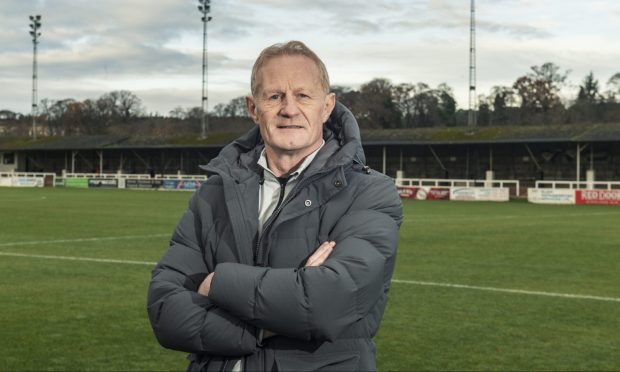
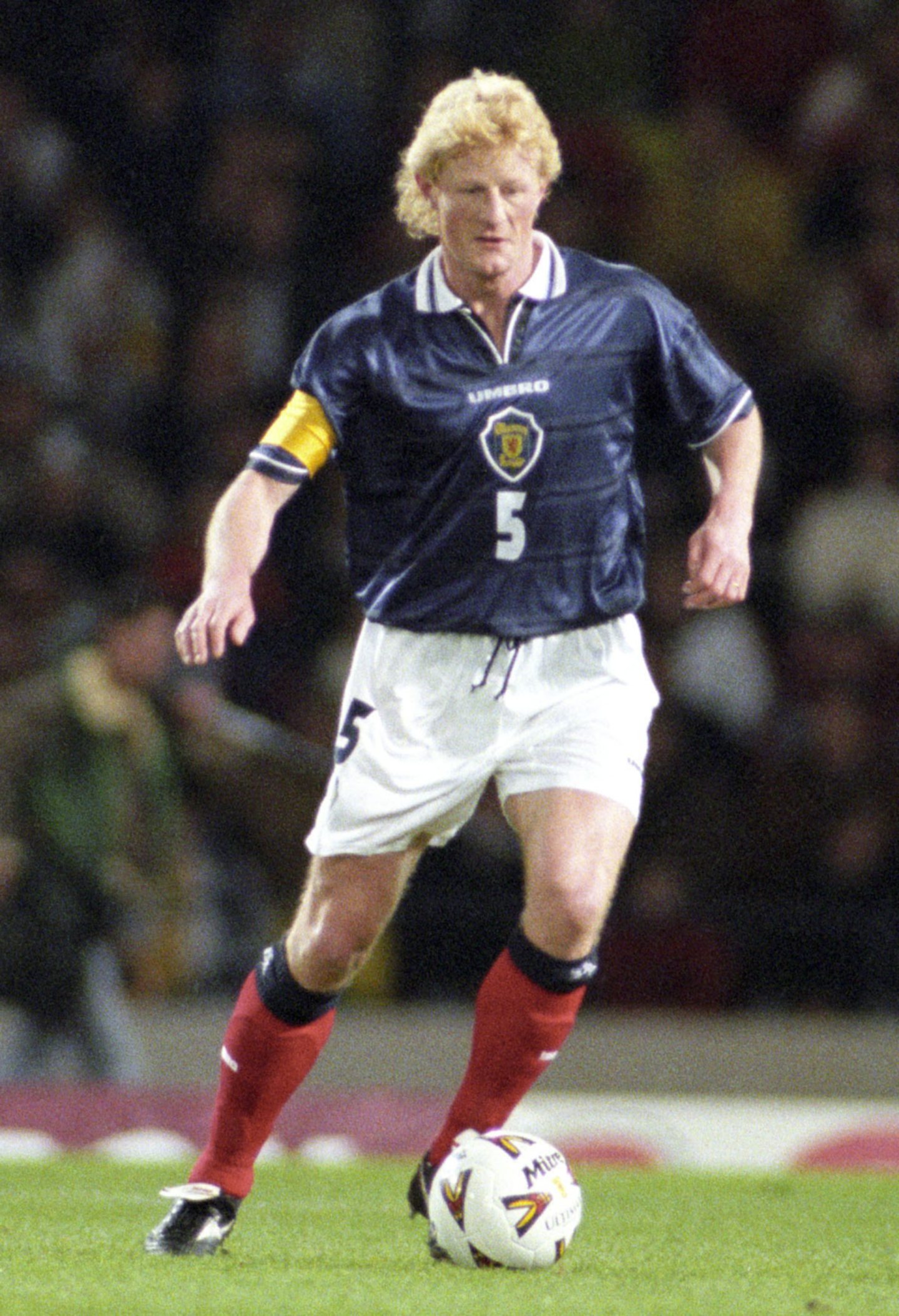
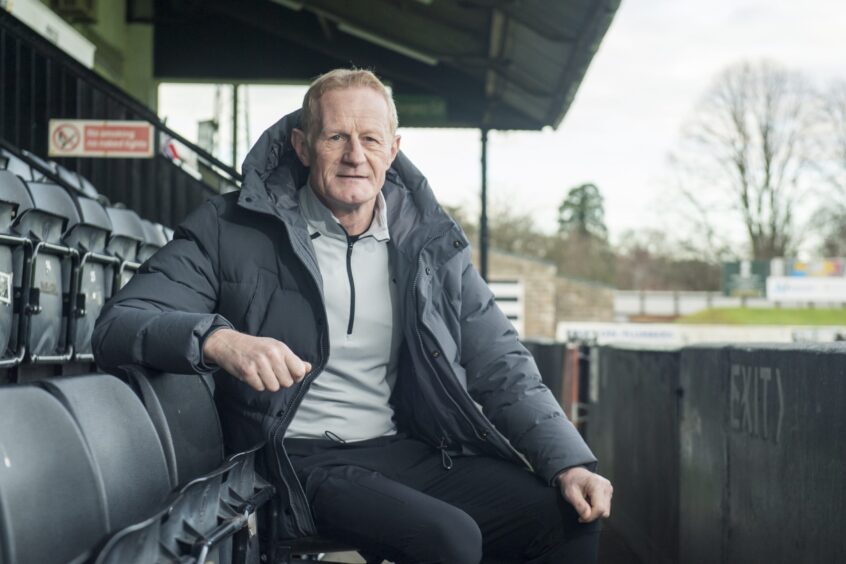
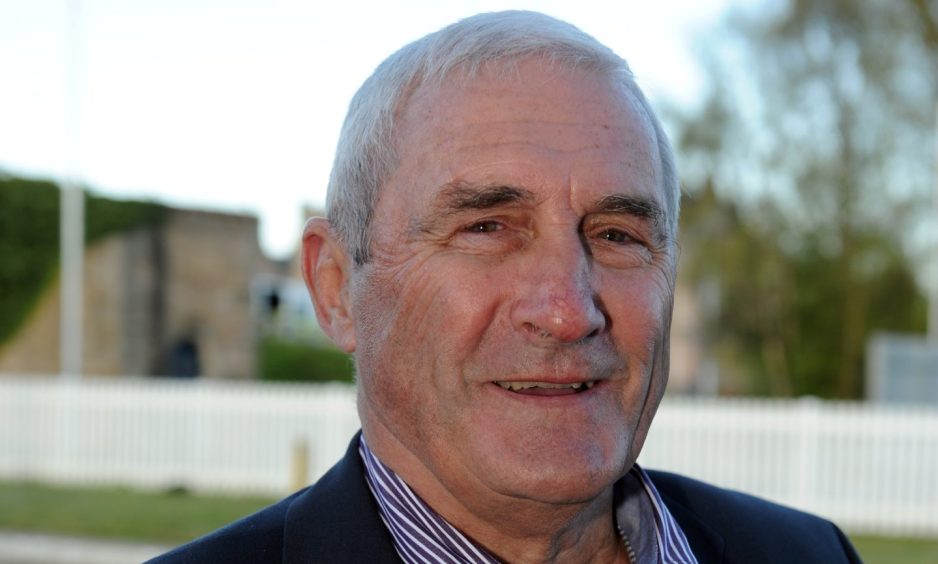
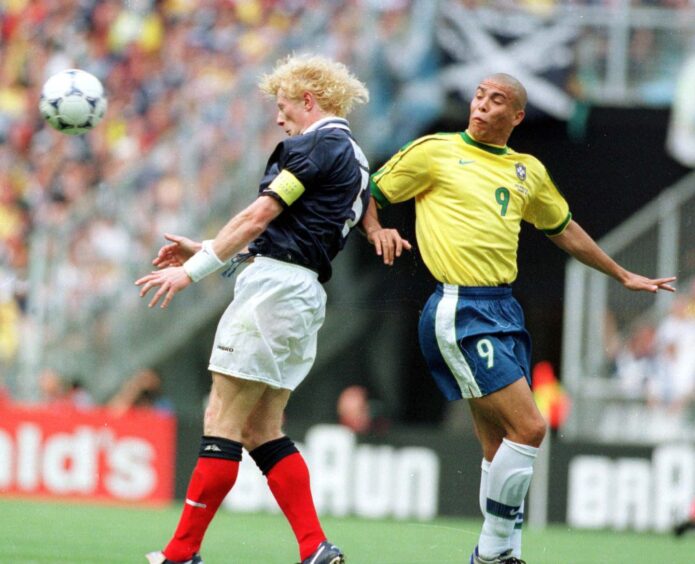
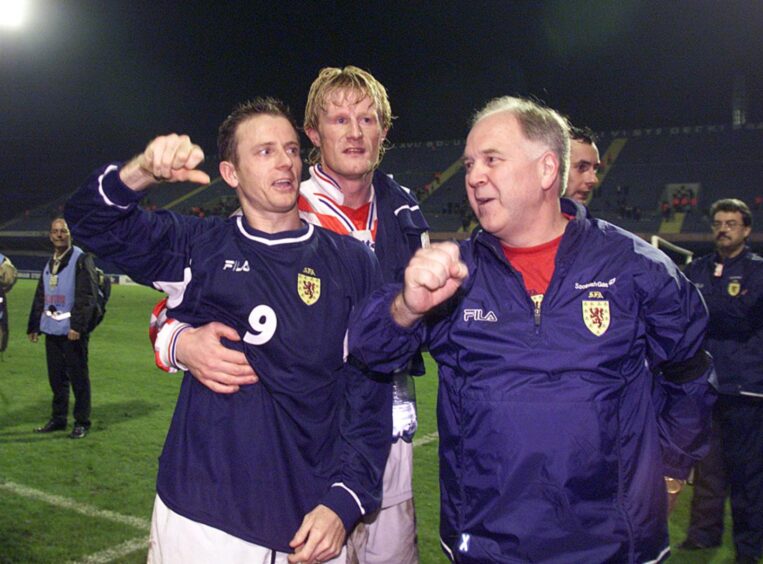
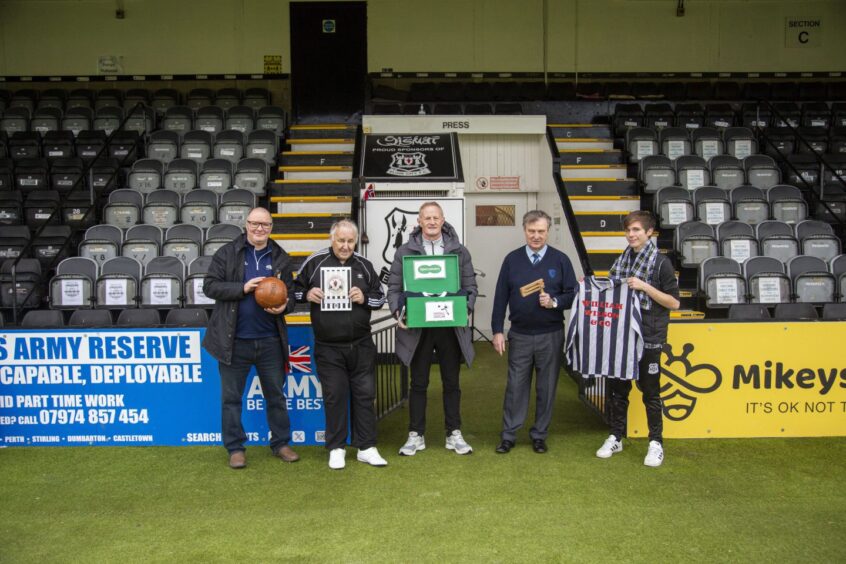
Conversation